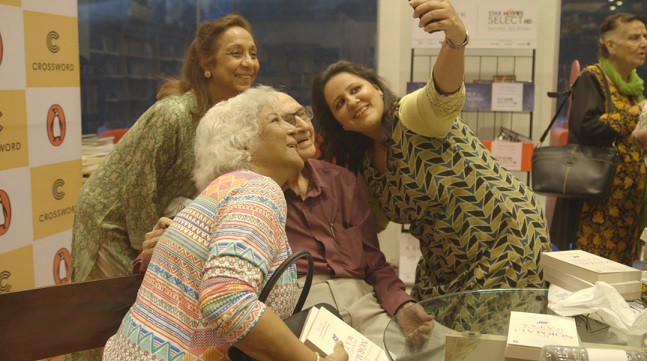Vaishali Sinha co-directed and produced the feature documentary “Made in India,” which focused on the personal stories behind the phenomenon of outsourcing surrogate mothers to India. The award-winning film premiered at Hot Docs and aired on PBS in 2012. Sinha has also produced numerous shorts.
“Ask the Sexpert” will premiere at the 2017 Hot Docs Canadian International Documentary Festival on May 1.
W&H: Describe the film for us in your own words.
VS: “Ask the Sexpert” is a film about a highly popular 93-year-old sex advice columnist in Mumbai. His daily column has been a city staple for the last 10 years. In the face of a ban on comprehensive sex education in schools in several states in India, the column’s brand of non-moralistic advice and humor has emboldened many to write in with their questions.
While a character-driven film, it is also a lens into a larger society and how human experiences have much in common.
W&H: What drew you to this story?
VS: I wanted to explore a story in the area of sexuality in urban India. Talking about sex carries a cultural taboo, although there are changes taking place now. I was seeking a space where people make their honest and rawest admissions of desire and dilemmas. This led me to the idea of a therapist or someone similar — a place where one would feel like they could benefit from telling the truth, or that at the very least they had nothing to lose.
Long story short, I quickly came across my central subject, who is wildly popular from his question and answer column.
W&H: What do you want people to think about when they are leaving the theater?
VS: It would be great if the film stays with people long after the curtain closes. On a micro-level I would love it if the film could lead to discussions between partners and between parents and children.
W&H: What was the biggest challenge in making the film?
VS: Telling a story about a character and ideas is both fun and hard work.
Funding was another difficult aspect. Constant grant writing and creating work samples can wear you down, but I was lucky to have some amazing funders. I’m also grateful to have an absolutely stellar team including producorial partner Mridu Chandra.
W&H: How did you get your film funded? Share some insights into how you got the film made.
VS: This film is a presentation by my company Coast to Coast Films in co-production with ITVS, who is our principal funder. ITVS is a leading funder and distributor for Public Media in the U.S. We’re just so honored to have them back a sex positive film.
But long before ITVS, there were other organizations who came in at very crucial moments with support for development and production, namely Catapult Fund, the MacArthur Foundation, and Tribeca Film Institute. Fireland Media — an incredible player in the doc world that helps filmmakers of color — provided mentorship support.
W&H: What does it mean for you to have your film play at Hot Docs?
VS: I couldn’t be more excited. This is where I premiered my first feature documentary, “Made in India,” and that was a phenomenal experience. Hot Docs is so professional and has an incredibly strong market. And Toronto audiences love documentaries.
Ultimately, my goal is to have this seen far and wide and jog conversations. We pitched our film at Hot Docs Forum in 2015 to a warm reception and we’re excited to come back and share the finished film.
W&H: What’s the best and worst advice you’ve received?
VS: Best advice: Keep it up.
Worst advice: Keep it up.
W&H: What advice do you have for other female directors?
VS: Trust your instincts and don’t hesitate to assert yourself.
W&H: Name your favorite woman-directed film and why.
VS: I’m going to be totally random off the top of my head and say Claire Denis’ “Trouble Every Day,” because it’s bold and arresting.
W&H: There have been significant conversations over the last couple of years about increasing the amount of opportunities for women directors yet the numbers have not increased. Are you optimistic about the possibilities for change? Share any thoughts you might have on this topic.
VS: I’m not entirely sure. I think there are opportunities being created but we have a long way to go as a lot of the commissioned content is still [going to men]. But creative ideas will always be in demand and there are many conscientious industry members and organizations making an effort to help facilitate conversations or create networking spaces for women to meet commissioners. So, there is progress.







